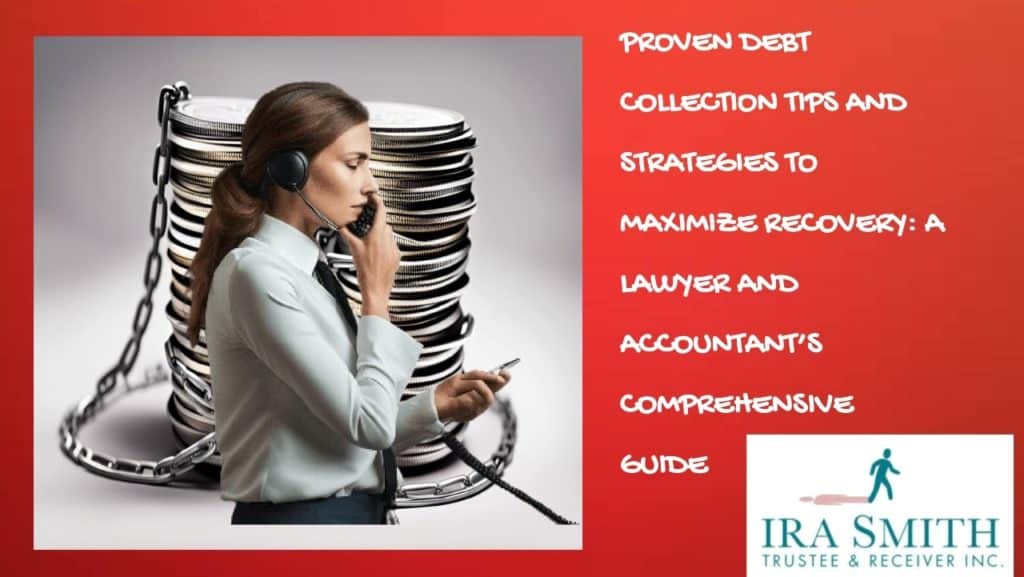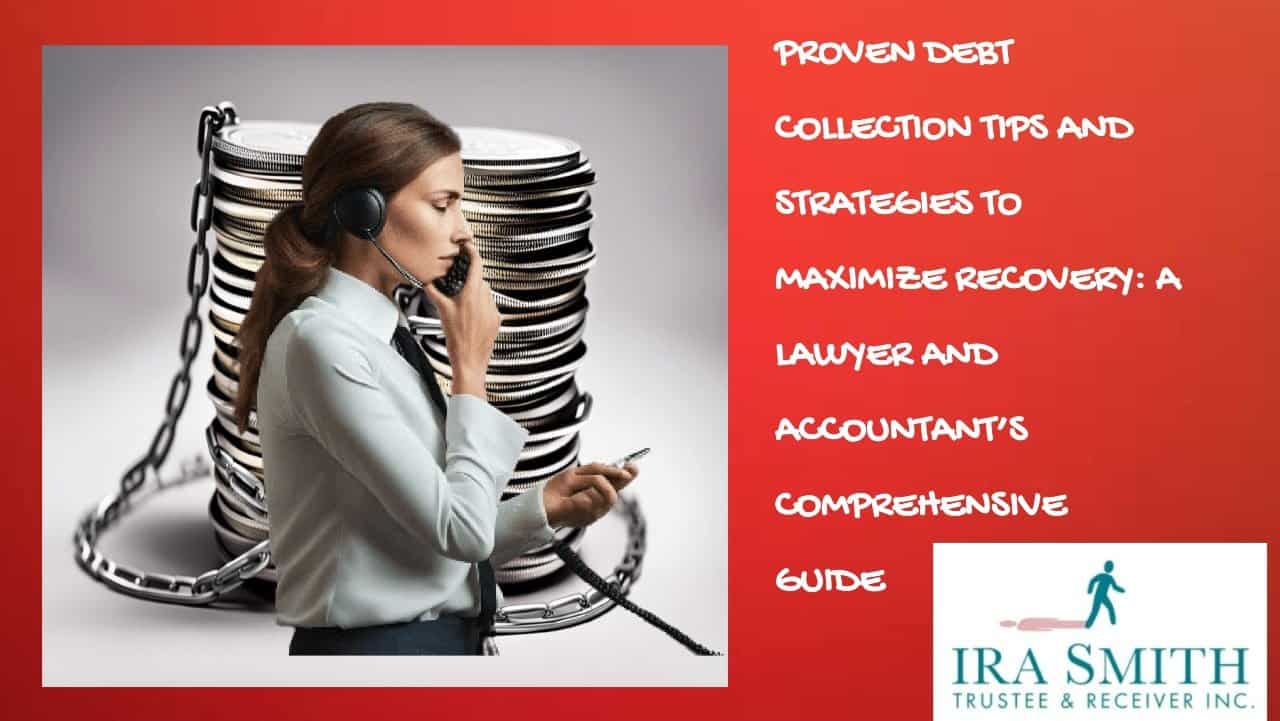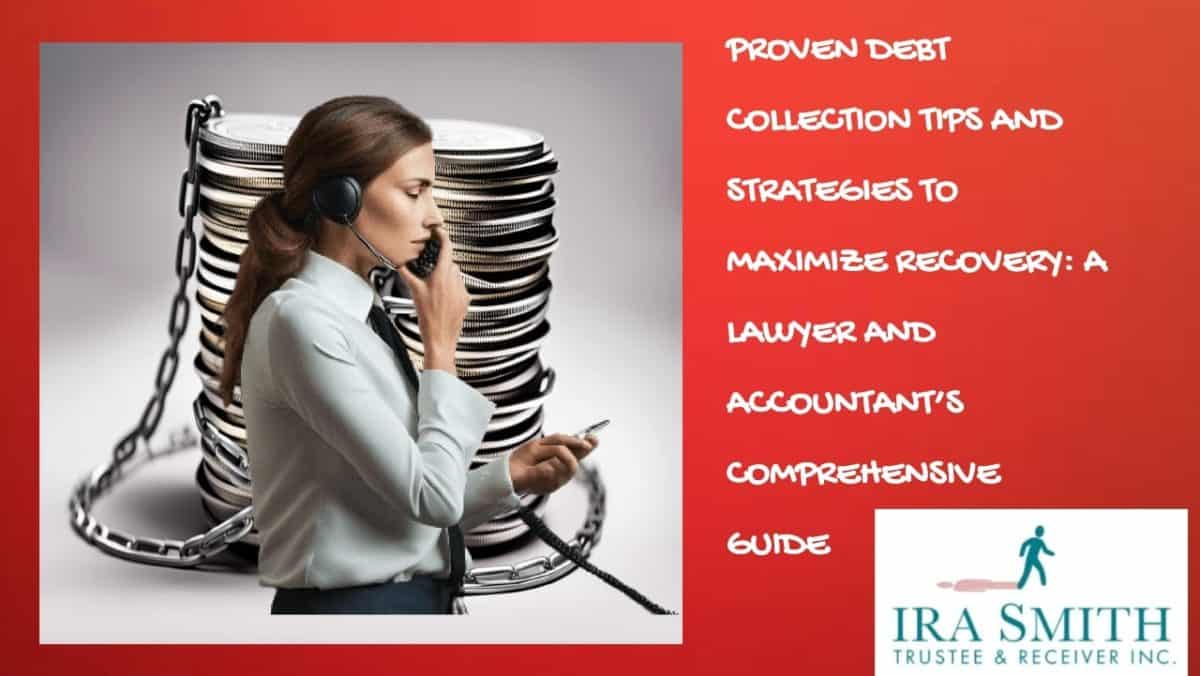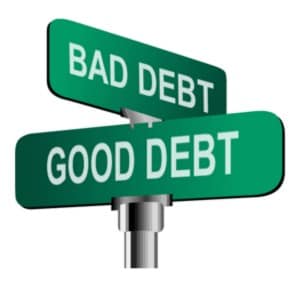Importance of Effective Debt Collection
Welcome to our comprehensive guide on debt collection strategies! In this Brandon’s Blog, you will discover many proven tips to maximize recovery and enhance your success rates in debt collection. Whether you are an experienced collector, just starting, or are an accountant or lawyer trying to help educate your clients, this resource is designed to equip you with effective methods for recovering unpaid debts.
From industry best practices to innovative tools and techniques, we provide valuable insights to help you streamline your collection processes and boost debt recovery. Stay tuned to learn how to optimize your approach and achieve better results in debt collection. Let’s elevate your success in debt recovery together!
Overview of the Debt Collection Process
The debt collection process is a crucial aspect of financial management that requires a strategic and systematic approach. It involves a series of steps to recover outstanding debts while maintaining positive relationships with debtors. From initial contact to negotiation and resolution, each stage demands precision and professionalism to ensure a successful recovery.
Understanding the legal framework, utilizing effective communication techniques, and leveraging technology are key components of a well-rounded debt collection process. Organizations can maximize recovery rates and optimize their financial performance by following best practices and implementing proven strategies. A comprehensive debt collection process overview is essential for success in debt recovery endeavours.
The Impact of Outstanding Debts on Businesses
Outstanding debts can have a significant impact on businesses of all sizes. When customers fail to pay for the products or services they have received, it can lead to a domino effect of financial challenges for the business. Here are some of the key ways in which outstanding debts can affect a business:
Cash Flow Strain: One of the most immediate impacts of outstanding debts is the strain it puts on the business’s cash flow. When invoices go unpaid, it can disrupt the regular flow of income into the business, making it difficult to cover operational expenses, pay employees, or invest in growth opportunities.
Hindered Growth Opportunities: Businesses rely on a healthy cash flow to invest in new projects, expand their operations, or launch new products and services. When a significant portion of the revenue is tied up in outstanding debts, it can hinder the business’s ability to seize growth opportunities and stay competitive in the market.
Profitability Challenges: Unpaid invoices directly impact the profitability of the business. As debts accumulate, it can lead to a decrease in profit margins, making it harder for the business to generate revenue and sustain its operations in the long run.
Damage to Reputation: Failing to collect outstanding debts can also damage the business’s reputation. Customers may view the business as unreliable or unprofessional if they repeatedly encounter issues with payments or outstanding debts. This can lead to a loss of trust and loyalty among customers, ultimately affecting the business’s bottom line.
Legal Risks: In some cases, businesses may face legal risks if they are unable to collect outstanding debts. Legal actions or disputes with customers can be time-consuming, costly, and damaging to the business’s reputation. Businesses need to have a solid debt collection strategy in place to minimize these risks and protect their interests.
Overall, outstanding debts can have a ripple effect on the financial health, growth opportunities, and reputation of a business. By implementing effective debt collection strategies and working with professional debt collection agencies, businesses can mitigate these risks and ensure a healthier financial future.
Understanding the Impact of Credit History and Credit Reports on Debt Collection
Debt collectors need to have a comprehensive understanding of how credit history and credit reports impact consumer behaviour. By gaining insight into these complexities, debt collectors can improve their communication and collaboration with debtors to reach mutually beneficial resolutions effectively.
This knowledge not only facilitates smoother interactions but also enables debt collectors to operate with professionalism and ethics. It enhances the likelihood of successful collections by customizing discussions to address debtors’ concerns about maintaining a positive credit score and credit report.
Understanding Debt Collection Tools and Systems
The Role of Artificial Intelligence in Debt Collection
Artificial Intelligence (AI) is revolutionizing the debt collection industry by providing businesses with innovative tools and technologies to improve their debt recovery processes. AI-powered solutions offer a wide range of benefits, including increased efficiency, accuracy, and scalability. Here are some key ways AI is transforming debt collection:
Automated Data Analysis: AI algorithms can analyze vast amounts of customer data to identify patterns and trends that can help businesses better understand customer behaviour and payment patterns. This insight allows businesses to develop more targeted and personalized debt collection strategies.
Predictive Analytics: AI-powered predictive analytics can forecast which customers are most likely to default on their payments, allowing businesses to prioritize high-risk accounts and allocate resources more effectively. This proactive approach can significantly improve debt recovery rates.
Chatbots and Virtual Assistants: AI-powered chatbots and virtual assistants can interact with customers in real time, providing personalized assistance and support throughout the debt collection process. These virtual agents can answer customer inquiries, negotiate payment terms, and even process payments, all while maintaining a high level of customer satisfaction.
Machine Learning: AI algorithms can continuously learn and adapt to new data, enabling businesses to optimize their debt collection strategies based on real-time insights. By leveraging machine learning capabilities, businesses can improve their collection efforts and maximize recovery rates.
Compliance and Risk Management: AI-powered solutions can help businesses ensure compliance with regulations and reduce the risk of non-compliance penalties. These tools can flag potential compliance issues, monitor regulatory changes, and provide guidance on best practices for debt collection.
AI is crucial in revolutionizing debt collection practices, helping businesses streamline their processes, improve efficiency, and maximize debt recovery rates. By leveraging AI-powered solutions, businesses can stay ahead of the curve and achieve award-winning collections success.
Benefits of Using Debt Collection Agencies
The benefits of using debt collection agencies include:
Efficient Recovery: Debt collection agencies specialize in recovering outstanding debts promptly and efficiently, ensuring a higher recovery rate.
Expertise and Industry Knowledge: Debt collection agencies have specialized knowledge of debt recovery laws, regulations, and best practices, enabling them to navigate the complexities of debt collection with precision.
Professional Expertise and Experience: Debt collection agencies bring a wealth of expertise and experience to the table, using successful tactics customized to each debtor’s situation to maximize recovery rates.
Streamlined Operations: By outsourcing debt collection to experts, businesses can focus on their core operations while the debt collection agency handles the details of debt recovery.
Improved Cash Flow: Recovering unpaid debts can improve cash flow and financial stability for businesses, enabling them to invest in growth opportunities and future success.
The Power of Online Payments in Debt Recovery
In today’s digital age, online payments have revolutionized the way organizations approach debt recovery. With the rise of self-service portals and digital payment platforms, customers have more control over their repayment options, leading to a more positive and efficient debt recovery experience.
One of the key advantages of online payments in debt recovery is the convenience it offers to past-due customers. By allowing customers to set up payment schedules, review their payment history, and make secure payments online, organizations are empowering customers to take charge of their debt repayment journey. This self-service approach not only gives customers a sense of control but also reduces the likelihood of resistance when it comes time to pay back.
Moreover, online payments streamline the debt recovery process for organizations as well. Debt collection software enables organizations to accept online payments without involving third-party merchants, ensuring added security and lower costs. Additionally, automated reminders and notifications can be sent to past-due customers, prompting them to make timely payments and reducing the manual workload for recovery teams.
By implementing a digital-first contact strategy and leveraging debt collection software, organizations can bridge the gap between customer expectations and the reality of debt recovery. Automating debt-collection tasks, such as implementing chatbots and virtual assistants, allows companies to scale up their debt-collecting operations without the need to hire more agents or allocate additional resources.
Segmentation based on the likelihood of self-cure and prioritization is also crucial in managing multiple past-due accounts effectively. By categorizing accounts based on their risk of non-recovery and legal implications, organizations can focus on addressing older debts with higher risks first and prevent further complications.
The power of online payments in debt recovery lies in its ability to provide customers with a convenient and secure way to repay their debts while streamlining the debt recovery process for organizations. By embracing digital payment solutions and automation, organizations can enhance the customer experience, improve collection rates, and ultimately achieve their debt recovery goals more efficiently.
Debt Collection: Establishing Effective Communication with Debtors
Communication Techniques are crucial in debt collection to maintain professionalism and foster positive relationships with debtors. By practicing active listening and empathy, collectors can better understand the debtor’s situation and work towards mutually beneficial solutions. Clear and transparent communication is key to conveying expectations, deadlines, and consequences effectively. Maintaining a professional demeanour in all interactions helps build trust and credibility, increasing the likelihood of successful debt recovery.
The Importance of Communication in Debt Collection
Clear and transparent communication is essential in debt collection to build trust and maintain positive relationships with debtors. By clearly explaining the debt situation, including outstanding amounts, due dates, and consequences of non-payment, collectors can ensure debtors understand their obligations.
Transparency in communication also involves providing accurate information about payment options, negotiation terms, and any legal implications.
This approach fosters cooperation and reduces misunderstandings, leading to more successful debt recovery outcomes. Maintaining a professional tone throughout all interactions and being open and honest in communication can help collectors establish credibility and increase the likelihood of recovering unpaid debts.
Effective Communication Techniques for Successful Debt Collection
Effective communication is essential in debt collection to build trust, foster transparency, and ultimately achieve successful debt recovery. By implementing the following communication techniques, creditors can enhance their interactions with debtors and improve their chances of recovering outstanding debts.
Personalization: When communicating with debtors, it is crucial to treat them as individuals rather than just an account number. Addressing them by their name and showing empathy towards their situation can help establish a more positive relationship and increase the likelihood of cooperation.
Clarity and Transparency: Communicate the terms of the debt, including the amount owed, due dates, and consequences of non-payment. Avoid using jargon or complex language that may confuse debtors, and be transparent about any fees or charges associated with the debt.
Active Listening: Listen attentively to debtors’ concerns, questions, and reasons for non-payment. By demonstrating active listening skills and showing an understanding of their perspective, creditors can build rapport and potentially find mutually beneficial solutions to resolve the debt.
Maintain a professional demeanour: While it is important to be empathetic and understanding towards debtors, it is equally important to maintain a professional demeanour in all interactions. Avoid using aggressive or threatening language, and always remain courteous and respectful, even in challenging situations.
By implementing these effective communication techniques in debt collection efforts, creditors can build stronger relationships with debtors, increase the likelihood of debt recovery, and ultimately improve their overall financial health. Remember, successful debt collection is about collecting money maintaining positive relationships and fostering trust with debtors.
Leveraging Communication Channels for Maximum Results
Effective communication is key in debt collection efforts, as it plays a significant role in building trust, resolving conflicts, and ultimately recovering debts. By leveraging various communication channels strategically, creditors can enhance their chances of successful debt recovery. Here are some tips on how to maximize the use of communication channels in debt collection:
Utilize Multiple Platforms: In today’s digital age, creditors have a plethora of communication channels at their disposal. Utilize emails, phone calls, text messages, and even social media platforms to reach out to debtors. By diversifying your communication channels, you increase the chances of getting a response from debtors and prompt them to take action on their outstanding debts.
Tailor Your Message: When communicating with debtors, it’s essential to tailor your message to suit their preferences and circumstances. Personalize your communication by addressing debtors by their name, acknowledging their specific debt, and outlining clear steps for resolution. By showing empathy and understanding, you can build a rapport with debtors and encourage them to cooperate in repaying their debts.
Define Expectations Clearly: Clearly outline the terms of the debt, including deadlines, consequences of non-payment, and available options for repayment. By setting clear expectations from the outset, you reduce the likelihood of misunderstandings and disputes down the line. Be transparent about the consequences of non-compliance while also offering assistance and flexibility where possible.
Provide Regular Updates: Maintain consistent communication with debtors by providing regular updates on the status of their debt. Keep them informed of any progress made in resolving the debt, any payments received, and any changes in the repayment plan. By keeping debtors in the loop, you demonstrate your commitment to resolving the issue and fostering transparency in the debt collection process.
By effectively leveraging communication channels in debt collection, creditors can improve their chances of recovering outstanding debts while maintaining positive relationships with debtors. Clear, personalized, and consistent communication can go a long way in facilitating successful debt recovery follow-ups and enhancing cash flow for businesses.
Debt Collection: Maintaining a Healthy Cash Flow and Financial Health
The Importance of Timely Payments for Cash Flow Management
Effective debt collection procedures are essential for maintaining a stable cash flow and financial health. Timely receipt of customer payments is crucial for ensuring that a company has the necessary funds to cover expenses and sustain operations. Prompt payment settlements also help reduce the risk of bad debt and enhance the overall financial well-being of the organization.
Delays or missed payments can significantly impact cash flow, leading to disruptions in the debt collection process. Therefore, businesses must prioritize timely payments to ensure efficient cash flow management and successful debt collection.
Strategies for Overcoming Financial Difficulties and Collecting Outstanding Balances
Many businesses face financial difficulties due to various reasons such as unexpected expenses or economic downturns. As a result, collecting outstanding balances has become a challenging task for debt collectors. To overcome these difficulties, it is important to implement effective debt collection strategies that not only help in recovering the outstanding balances but also maintain a positive relationship with the debtors.
Strategies include proactive communication, offering flexible payment plans, and utilizing the services of professional debt collection agencies. By using these strategies, debt collectors can navigate through financial difficulties and successfully collect outstanding balances while maintaining professionalism and empathy towards the debtors.
Legal Considerations and Risk Management in Debt Collection
Legal considerations and risk management are pivotal components in the realm of debt collection practices. The provinces establish the laws that debt collectors must abide by. In Ontario, debt collectors are obliged to abide by the Collection and Debt Settlement Services Act, R.S.O. 1990, c. C.14. Lenders regulated at the federal level, must adhere to appropriate federal laws, to avoid negative legal repercussions. This entails upholding accurate and timely communication with debtors, respecting their privacy, and refraining from engaging in any form of harassment or deceitful methods.
Furthermore, debt collectors must possess a comprehensive understanding of the potential risks entailed in debt collection, such as potential lawsuits or detrimental effects on their own or their clients’ reputations. By implementing effective risk management strategies, such as meticulous documentation and compliance procedures, these risks can be mitigated, ultimately ensuring that debt collection practices are conducted ethically and lawfully.
Through the prioritization of legal considerations and risk management, debt collectors can uphold a professional and esteemed image, while effectively recovering debts.
Debt Collection Conclusion
I hope you enjoyed this debt collection from Brandon’s Blog. This is the final blog in our “Lawyers and Accountants” series. Individuals and business owners must take proactive measures to address financial difficulties, consumer debt and company debt and promptly seek assistance when necessary. It is crucial to recognize that financial stress is a prevalent concern and seeking help is a demonstration of fortitude, rather than vulnerability. Should you encounter challenges in managing your finances and find yourself burdened by stress, do not delay in pursuing aid.
Revenue and cash flow shortages are critical issues facing people, entrepreneurs and their companies and businesses with debt problems that are in financial distress. Are you now worried about just how you or your business are going to survive? Are you worried about what your fiduciary obligations are and not sure if the decisions you are about to make are the correct ones to avoid personal liability? Those concerns and more associated with your company debt are obviously on your mind.
The Ira Smith Team understands these overwhelming debt financial health concerns. More significantly, we know the requirements of the business owner or the individual who has way too much financial debt. You are trying to manage these difficult financial problems and you are understandably anxious. It is not your fault you can’t fix this problem on your own and it does not mean that you are a bad person. The pandemic has thrown everyone a curveball. We have not been trained to deal with this. You have only been taught the old ways. The old ways do not work anymore.
The Ira Smith Team uses innovative and cutting-edge methodologies, to adeptly navigate you through the intricacies of your financial challenges ensuring a resolution to your debt-related predicaments without resorting to the rigours of the bankruptcy process. We can get you debt relief now! We have helped many entrepreneurs and their insolvent companies who thought that consulting with a Trustee and receiver meant their company would go bankrupt.
On the contrary. We helped turn their companies around through financial restructuring. We look at your whole circumstance and design a strategy that is as distinct as you are. We take the load off of your shoulders as part of the debt settlement strategy we will draft just for you.
The Ira Smith Trustee & Receiver Inc. team understands that people facing money problems require a lifeline. That is why we can establish a restructuring procedure for you and end the discomfort you feel. Call us now for a no-cost consultation. We will listen to the unique issues facing you and provide you with practical and actionable ideas you can implement right away to end the pain points in your life, to begin your debt-free life, Starting Over, Starting Now.






